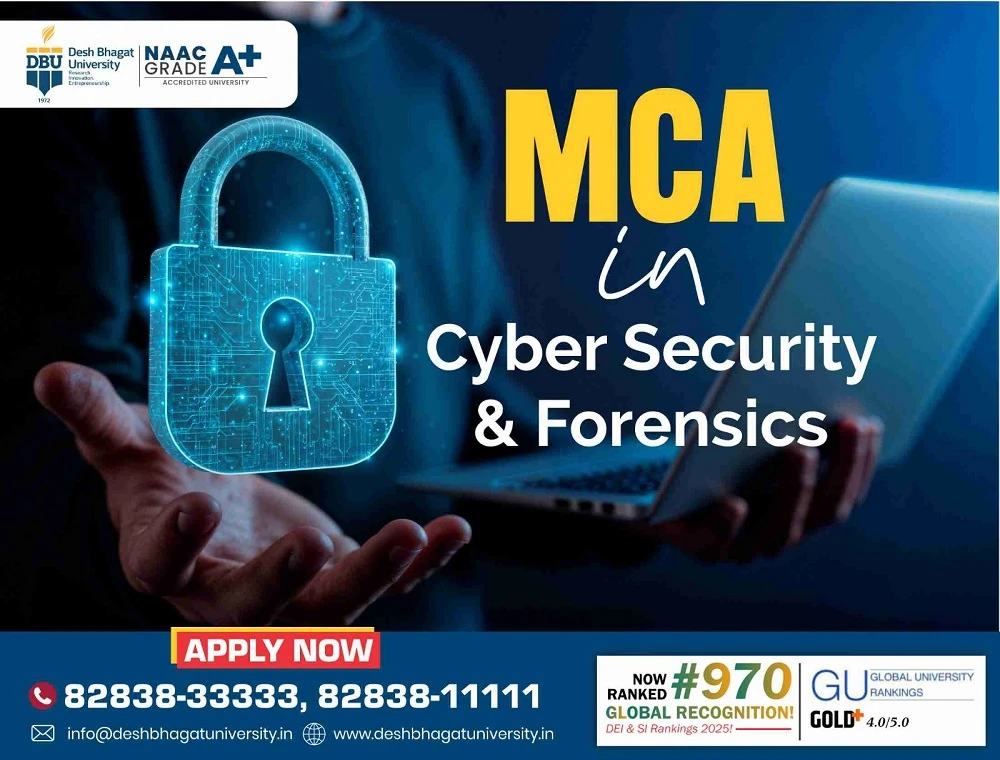MCA in Cyber Security and Forensics – Syllabus, Eligibility, Scope
November 8, 2025 2025-11-08 7:39MCA in Cyber Security and Forensics – Syllabus, Eligibility, Scope

MCA in Cyber Security and Forensics – Syllabus, Eligibility, Scope
As technology advances, the demand for professionals who can secure digital spaces grows. Cybersecurity has become one of the most important fields today, as it helps protect data, information, and systems from digital threats. If you’re interested in safeguarding the digital world, pursuing an MCA in Cyber Security & Forensics from Desh Bhagat University (DBU) is a good decision. This article will guide you through everything you need to know about this course, including its syllabus, eligibility criteria, career opportunities, and more.
What is MCA in Cyber Security & Forensics?
The Master of Computer Applications (MCA) with a specialization in Cyber Security & Forensics is a postgraduate degree that focuses on developing skilled professionals who can safeguard digital data and systems from cyber-attacks, crimes, and vulnerabilities. At Desh Bhagat University, this course equips students with advanced skills in computer science, security measures, and forensic investigations.
The MCA in Cyber Security & Forensics combines technical knowledge of computer applications with a deep understanding of cyber law, encryption, ethical hacking, and digital forensics. The program aims to produce professionals capable of analyzing, protecting, and investigating digital crimes. Graduates of this program are prepared for roles in various sectors, including government, banking, defense, and the private sector.
Why Choose MCA in Cyber Security & Forensics at DBU?
There are several reasons why choosing Desh Bhagat University for your MCA in Cyber Security & Forensics makes sense:
- Comprehensive Curriculum: The University offers a well-rounded syllabus that covers all aspects of cybersecurity, from theoretical concepts to hands-on practical skills. This ensures that students are well-prepared for real-world challenges.
- Industry-Oriented Approach: DBU integrates industry-relevant practices into the curriculum. This helps students stay updated with the latest trends and technologies in the cyber security field.
- State-of-the-Art Facilities: The University boasts modern labs equipped with the latest tools for ethical hacking, digital forensics, and network security, providing students with practical exposure to real-life situations.
- Experienced Faculty: DBU’s faculty members are experienced professionals who bring a wealth of knowledge and industry experience to the classroom. They guide students through complex concepts and help them develop practical problem-solving skills.
- Placement Opportunities: DBU has a strong placement record, with many graduates being placed in reputed companies, government agencies, and security firms. The university’s strong industry connections open doors for students to secure excellent job opportunities.
- Flexible Learning Modes: DBU offers both regular and online modes of study for the MCA program, making it easier for working professionals and students from different locations to pursue the degree.
MCA in Cyber Security & Forensics – Syllabus Overview
The MCA in Cyber Security & Forensics at Desh Bhagat University is designed to provide students with a comprehensive understanding of computer science, cyber security, and forensics. The syllabus is spread across four semesters (two years) and is updated to reflect the latest trends and developments in the industry.
1st Semester: Core Computer Science Topics
- Mathematics for Computer Science: Introduction to basic mathematical concepts used in computing, including logic, sets, matrices, and probability.
- Programming in C/C++: Learning the fundamentals of programming languages such as C and C++, focusing on developing efficient and error-free software.
- Computer Organization and Architecture: Understanding how computers work, including processors, memory, and input/output devices.
- Operating Systems: Study of operating system concepts like process management, memory management, and file systems.
- Database Management Systems: Learning how databases are designed, managed, and manipulated using SQL and other database management systems.
- Computer Networks: Basics of networking, protocols, and how computers communicate over a network.
2nd Semester: Advanced Computing Concepts
- Advanced Programming Techniques: Building on the skills from the first semester, students learn object-oriented programming and advanced concepts in C++ and Java.
- Software Engineering: Introduction to the software development lifecycle, project management, and software testing.
- Web Technologies: Understanding web development using HTML, CSS, JavaScript, and PHP.
- Data Structures and Algorithms: Learning how to organize data efficiently and solve complex problems using algorithms.
- Digital Logic and Circuit Design: Basics of digital logic and circuit design, which are crucial for understanding how digital devices work.
- Cyber Law and Ethics: Introduction to cyber law, digital privacy, intellectual property rights, and ethical issues in the digital world.
3rd Semester: Cyber Security Specialization
- Introduction to Cyber Security: Understanding the basics of cyber security, common threats, and preventive measures.
- Ethical Hacking and Penetration Testing: Learning how to identify security vulnerabilities by simulating cyber-attacks in a controlled environment.
- Cryptography: Study of encryption methods used to secure data and communications, including symmetric and asymmetric encryption algorithms.
- Network Security: Exploring techniques for securing networks, including firewalls, intrusion detection systems, and secure communication protocols.
- Digital Forensics: Learning how to collect, analyze, and preserve digital evidence from cybercrimes, including forensic tools and techniques.
- Security in Cloud Computing: Focus on securing data and applications hosted on cloud platforms, covering topics like virtualization, cloud attacks, and countermeasures.
4th Semester: Advanced Cyber Security Topics and Research
- Advanced Digital Forensics: Deep dive into the techniques used in recovering deleted files, tracking cybercriminals, and investigating digital fraud.
- Incident Response and Management: Learning how to respond to cyber incidents, mitigate damage, and recover from attacks.
- Malware Analysis: Understanding how malicious software works, how to analyze it, and how to defend systems against it.
- Security Management: Managing security policies, risk management, and ensuring compliance with laws and regulations.
- Capstone Project: Students will work on a real-world project, applying their skills to solve an actual problem in the field of cybersecurity or forensics.
- Industry Internship: Students are encouraged to take up internships with security companies or law enforcement agencies to gain practical experience.
Eligibility Criteria for MCA in Cyber Security & Forensics
To be eligible for the MCA in Cyber Security & Forensics program at Desh Bhagat University, you need to meet the following requirements:
- Educational Qualification: You must have a Bachelor’s degree (BCA, B.Sc. in Computer Science, or any related field) from a recognized university with a minimum of 50% marks in your undergraduate studies. Students from other technical backgrounds may also be considered if they have the required foundation in computer science or mathematics.
- Mathematics: A strong foundation in mathematics, either at the 10+2 level or in your undergraduate degree, is essential. Subjects like algebra, calculus, and statistics are important in understanding various computer science and security concepts.
- Entrance Exam: Some programs may require you to take an entrance exam or undergo an interview to assess your knowledge of computer science fundamentals and your potential for the program.
Career Opportunities after MCA in Cyber Security & Forensics
After completing an MCA in Cyber Security & Forensics, graduates can pursue various career opportunities in both the public and private sectors. Some of the job roles include:
- Cyber Security Analyst: Responsible for protecting systems and networks from digital threats and breaches.
- Digital Forensics Investigator: Specializes in investigating cybercrimes, recovering digital evidence, and supporting law enforcement agencies.
- Penetration Tester: Conducts ethical hacking to test the security of systems and networks and identify vulnerabilities.
- Network Security Engineer: Designs, implements, and manages security solutions for protecting an organization’s network infrastructure.
- Security Consultant: Provides expert advice on security policies, risk management, and compliance.
- Incident Responder: Deals with cyber incidents, helps organizations recover from breaches, and strengthens security defences.
- Cyber Law Specialist: Advises on legal matters related to cybercrime, privacy, and intellectual property.
- Chief Information Security Officer (CISO): Oversees the security infrastructure of an organization and manages all aspects of cybersecurity.
- Security Researcher: Conducts research on the latest cyber threats, vulnerabilities, and defence mechanisms.
Salary Expectations
Salaries for graduates with an MCA in Cyber Security & Forensics can vary depending on experience, job role, and location. However, on average, entry-level salaries range from ₹4,00,000 to ₹6,00,000 per annum. With experience and expertise, professionals in this field can earn ₹10,00,000 or more per year, especially in specialized roles like security architects or consultants.
Why Choose Desh Bhagat University?
Desh Bhagat University is one of the top institutions in Punjab for pursuing an MCA in Cyber Security & Forensics. The university’s modern infrastructure, experienced faculty, and industry connections ensure that students receive a high-quality education. DBU also focuses on practical learning through projects, internships, and industry collaboration.

Conclusion
The MCA in Cyber Security & Forensics at Desh Bhagat University is an excellent choice for anyone looking to make a career in cyber security. With a comprehensive syllabus, expert faculty, and industry exposure, DBU prepares students to face the challenges of securing digital spaces and investigating cybercrimes. Whether you aim to work in the IT industry, law enforcement, or a government agency, this program offers the skills and knowledge you need to succeed in the fast-growing field of cybersecurity.
FAQs
1. What is MCA in Cyber Security & Forensics?
MCA in Cyber Security & Forensics is a postgraduate course that teaches students how to protect computer systems from cyber-attacks and investigate digital crimes. It covers areas like ethical hacking, network security, digital forensics, and cyber law. This course helps students learn to secure data and systems and solve digital crime cases.
2. What is the eligibility for MCA in Cyber Security & Forensics?
To be eligible for MCA in Cyber Security & Forensics, you must have a Bachelor’s degree (such as BCA, B.Sc. in Computer Science, or a related field) from a recognized university. You should have a minimum of 50% marks in your undergraduate studies, and a background in mathematics is usually required.
3. How long does it take to complete the MCA in Cyber Security & Forensics?
The MCA in Cyber Security & Forensics takes 2 years to complete. It is divided into 4 semesters, with each semester covering various subjects related to computer science, cyber security, and forensics. Some universities may offer a 3-year program, depending on the eligibility of the student.
4. What subjects are covered in the MCA Cyber Security syllabus?
The MCA Cyber Security syllabus includes subjects such as Cryptography, Ethical Hacking, Network Security, Digital Forensics, Cyber Law, Cloud Security, and Malware Analysis. The program also covers Programming, Operating Systems, Data Structures, and other core computer science topics in the initial semesters.
5. What are the career opportunities after completing MCA in Cyber Security & Forensics?
After completing MCA in Cyber Security & Forensics, you can work as a Cyber Security Analyst, Digital Forensics Investigator, Penetration Tester, Network Security Engineer, or a Cyber Security Consultant. There are also opportunities in government agencies, law enforcement, IT firms, and private consulting.
6. Can I pursue MCA in Cyber Security if I don’t have a computer science background?
If you do not have a computer science background, you may still be eligible to apply for the MCA in Cyber Security & Forensics as long as you have a Bachelor’s degree in any related field (like BCA or B.Sc.). A strong foundation in mathematics is essential, as many topics in cybersecurity require analytical skills.
7. Is an internship required during the MCA in Cyber Security program?
Yes, an internship is highly encouraged as part of the MCA in Cyber Security & Forensics program. Internships give students hands-on experience in cyber security and digital forensics. It allows students to apply their knowledge to real-world scenarios and gain valuable industry exposure.
8. What are the job roles available after completing MCA in Cyber Security & Forensics?
Graduates of the MCA in Cyber Security & Forensics can take up roles like Cyber Security Analyst, Penetration Tester, Digital Forensics Investigator, Network Security Engineer, and Security Consultant. They can work in industries such as IT, banking, government agencies, and law enforcement.
9. What is the average salary after completing MCA in Cyber Security?
The salary for a fresher with an MCA in Cyber Security & Forensics typically ranges from ₹4,00,000 to ₹6,00,000 per year. With more experience, professionals can earn higher salaries, especially in roles like Cyber Security Consultant or Security Architect, where salaries can exceed ₹10,00,000 annually.
10. How does Desh Bhagat University help students in MCA Cyber Security & Forensics?
Desh Bhagat University offers a well-rounded MCA in Cyber Security & Forensics with experienced faculty, modern labs, and industry-oriented projects. The university focuses on both theoretical knowledge and practical skills. Students are also given opportunities for internships and placements, helping them prepare for successful careers in cyber security and forensics.






